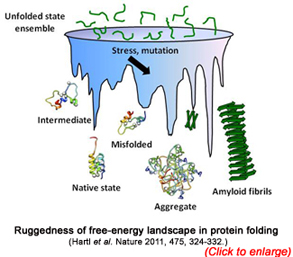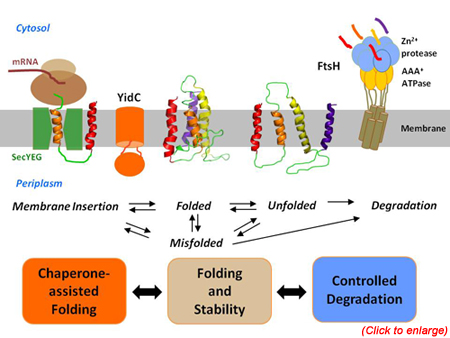Current Research
 Protein folding is an amazing molecular process that occurs by sorting out an astronomical
number of possible conformations. In crowded cellular environment, stresses or mutations
can mislead polypeptide chains to misfolded or catastrophic aggregate states. Therefore,
these unnecessary proteins have to be cleared from cells for quality control and regulatory
purposes. Although there have been remarkable advances in understanding these phenomena
and related diseases, efforts have been largely limited to water-soluble proteins
excluding the other major class of proteins that reside in cell membranes.
Protein folding is an amazing molecular process that occurs by sorting out an astronomical
number of possible conformations. In crowded cellular environment, stresses or mutations
can mislead polypeptide chains to misfolded or catastrophic aggregate states. Therefore,
these unnecessary proteins have to be cleared from cells for quality control and regulatory
purposes. Although there have been remarkable advances in understanding these phenomena
and related diseases, efforts have been largely limited to water-soluble proteins
excluding the other major class of proteins that reside in cell membranes.
Our research focuses on a fundamental biological question, how membrane proteins are made and destroyed in cells. Membrane proteins comprise approximately 30% of all proteins encoded in genes and carry out numerous critical functions. The folding problem of membrane proteins is directly related to human health. Indeed, accumulation of misfolded membrane proteins causes serious diseases such as Alzheimer’s disease, cystic fibrosis, and cancer. To answer our cardinal question, we investigate two conceptually connected biological processes by biochemical and biophysical methods.
